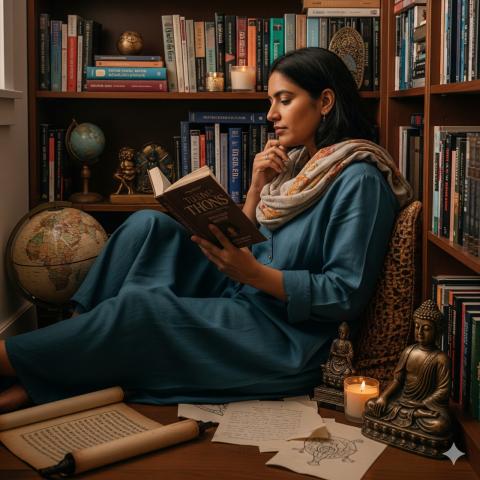
I Don’t Read to Remember
“How do you remember what you read?” a friend asked me after noticing a book in my hand. I countered with a question of my own: “Where does this assumption even come from—that what we read must be remembered?”
I don’t read to remember. I read to understand myself a little better. I read to make sense of my reflections, my confusions, and my questions about life. Each reading is not a memory exercise but an encounter—sometimes clarifying, sometimes unsettling.
For instance, I recently read a piece on teacher agency, titled “ From teacher agency to teacher agencies: A response-able re-conceptualization” by Tanjin Ashraf. For years, I thought I understood what it meant. But in a single reading, that clarity dissolved. Suddenly, I didn’t know what the teacher agency was anymore. And instead of feeling defeated, I felt strangely alive. That’s what reading often does—it unsettles certainties, opens up new questions, and makes me sit with fresh confusion.
Reading Beyond Memory
When I read, I don’t aim to preserve every line or argument. I look for something else—an analogy, a phrase, or a rhythm of thought that lingers. Midnight’s Children gave me this: “Where there is a ladder, there is a snake.” Such a simple image, yet endlessly layered in meaning.
Or take Simone de Beauvoir’s words:
“Only since women have begun to feel at home on this earth has a Rosa Luxemburg or a Marie Curie emerged. They brilliantly demonstrate that it is not women’s inferiority that has determined their historical insignificance: it is their historical insignificance that has doomed them to inferiority.”
These lines live with me, and I often adapt them to reflect on teachers: it is not teachers’ inferiority that has determined their historical insignificance; it is their historical insignificance that has doomed them to inferiority.
This is why I read—to stumble upon arguments, metaphors, and phrases that reframe the world for me.
Reading to Enter Lives
I also read to enter into the lives of others. Writers become companions, and through them I learn the plurality of life. With Tagore’s Gora, Premchand’s stories, or Harishankar Parsai’s sharp wit, I see how laughter and critical reflection dance together.
Sometimes literature teaches me about science more than science itself. Through stories, I discover how imagination builds the foundations of what we later call “scientific temper.”
Reading also roots me in history. From Harari to Irfan Habib, from William Dalrymple to Romila Thapar, I trace the practices, myths, and beliefs that shape my journey. I begin to understand what I inherit, knowingly or unknowingly. Nehru’s Discovery of India or Durant’s sweeping histories remind me that knowledge is not just accumulation but expansion—an unfolding of human pursuits across centuries.
And then there are the voices of plurality—Vinod Kumar Shukla’s quiet magic, Rahi Masoom Raza’s raw truths—each whispering that the world is never one, but many.
Reading for What I Am Not
I read to witness struggles I have not lived. Viktor Frankl’s Man’s Search for Meaning, Hosseini’s A Thousand Splendid Suns, Anne Frank’s diary—these are not my worlds, but they deepen my empathy for them.
I also read to unlearn. To question the beliefs I carry, to peel away the layers of conditioning. Some readings challenge me more than others, but all remind me that learning often begins with unlearning.
And of course, I read because I teach. To write better, to explain better, to listen better. Teaching and reading are inseparable companions for me.
Reading as a Mirror
At its core, reading is my way of demystifying life—though perhaps the mystery only deepens. Each book shows me my own limitations of understanding. Each sentence reminds me that the universe of knowledge is far larger than what I hold.
I read for beauty, for art, for literature. For that one unexpected phrase that my lips want to repeat aloud. For that one sentence that keeps echoing long after the book is closed.
And finally, I read to know how little I know. That, perhaps, is the most liberating part.
So, when I am asked, “How do you remember what you read?” My answer is simple: I don’t. I don’t try to. Because the purpose of reading, for me, is not memory. It is an encounter. Encounter with ideas, with questions, with plurality, with laughter, with struggle, with beauty. I read not to fill my mind with facts, but to live a little more deeply, and to remain open to the endless, unfinished, and humbling journey of knowing.
- Log in to post comments
